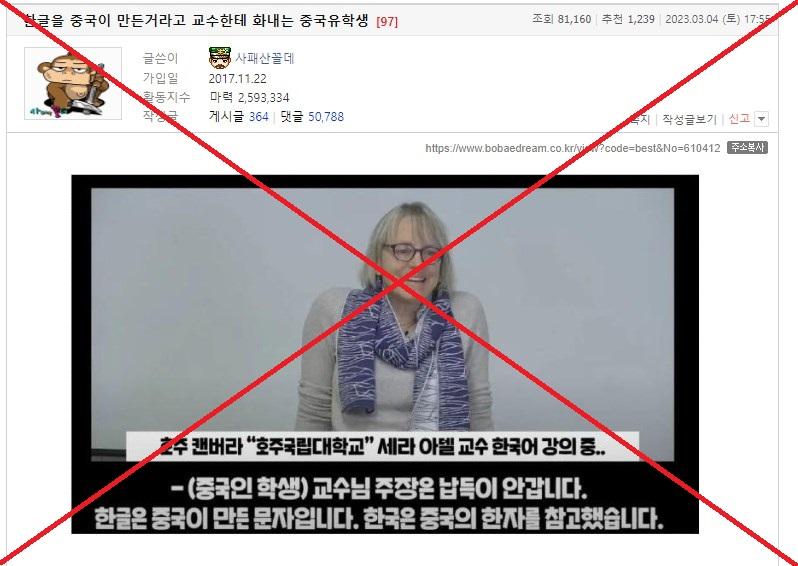
Video falsely shared as 'anti-Chinese lecture' on Korean writing
- This article is more than two years old.
- Published on March 14, 2023 at 05:26
- Updated on March 14, 2023 at 05:57
- 3 min read
- By SHIM Kyu-Seok, AFP South Korea
"A Chinese international student angrily claiming to a professor that Hangul was made by China," reads a Korean-language post shared on March 4 on popular South Korean online forum Bobaedream.
The post shows photos of a woman it identifies as "Sarah Adele, a professor at the Australian National University in Canberra, Australia."
Korean subtitles on the images purport to show an exchange between the professor and a Chinese student, who told her: "Korean characters were invented by China" and "Korean characters and Chinese characters are very similar. They also have the same grammatical structure."
The professor supposedly responded: "Chinese people, why don't you guys use Korean characters instead of Chinese characters? Chinese characters are too difficult for foreigners to learn. It seems like you guys like Korean characters. I don't get why you guys are still using Chinese characters."

China is home to one of the world's largest populations of overseas Koreans and the countries share deep cultural links.
But relations have soured over a spate of cultural clashes, with Seoul accusing Beijing of cultural appropriation for its efforts to label kimchi -- a staple of Korean cuisine made of cabbage -- as a variant of Chinese pickled vegetables. A Chinese performer who wore traditional Korean dress at the opening ceremony of the Beijing Olympics also sparked fury in the South.
AFP previously debunked posts falsely claiming to show a Chinese student at Oxford University arguing that K-pop was actually Chinese.
These claims often provoke visceral responses online, as seen in recent posts about Korea's writing system.
"This Chinese student clearly didn't pay attention in class if she thinks Korean and Chinese have similar grammar," one person commented.
"This professor speaks the truth. What have they been teaching them in China?" another user wrote.
Similar posts circulated on various platforms in South Korea, including blogs here, here and here, and Facebook.
Neuroscience lecture
The Australian National University said it had no professor by the name of Sarah Adele.
"We can confirm the university has no record of a staff member – academic or professional – of that name," a spokesman told AFP on March 9.
Reverse image searches of the photo in the posts found a YouTube video about a lecture on the human brain at the Massachusetts Institute of Technology (MIT).
The lecture, delivered by Nancy Kanwisher, professor of cognitive neuroscience, on February 6, 2019, does not mention Korean or Chinese.
Below is a screenshot comparison of one of the photos shared in false posts (left) and the MIT lecture (right):

Korea's writing system
According to the South Korean state-funded Institute for Basic Science (IBS), the Korean language previously employed a writing system called Hanja, which used Chinese characters and was written vertically from right to left.
Hanja was widely used until the 20th century but was gradually phased out in favour of Hangul, a phonetic alphabet written horizontally from left to right.
Today, written Korean "almost exclusively" uses Hangul, the IBS says.
Historical records show that Hangul was developed by Korea's King Sejong in the 15th century to represent the sounds of the Korean language, a representative for the National Institute of the Korean Language told AFP.
In the preface to the Huminjeongeum manuscript, a document outlining the principles of Hangul, Sejong wrote that the spoken Korean language "is different from that of China and does not correspond with what is written in Chinese characters. Many of the uneducated are unable to express what they want to say. Out of pity for them, we have created 28 letters that may be mastered by all our subjects with ease for convenient daily use."
Copyright © AFP 2017-2026. Any commercial use of this content requires a subscription. Click here to find out more.
Is there content that you would like AFP to fact-check? Get in touch.
Contact us
